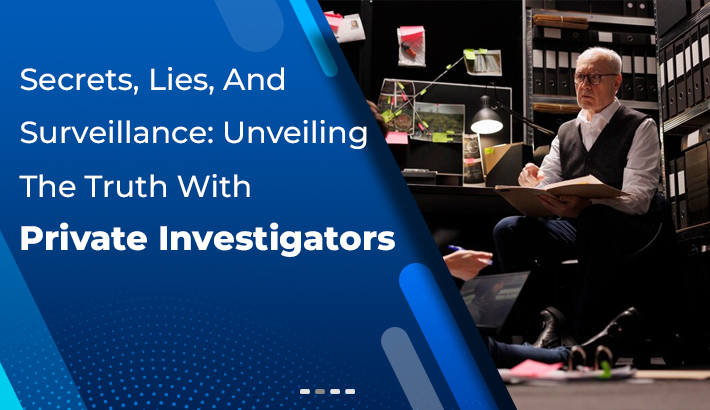The realm of private investigation carries an aura of mystery, often depicted in movies with trench coats, clandestine meetings, and high-stakes stakeouts. However, beneath this Hollywood glamor lies a profession rooted in diligence, dedicated to unveiling the truth regardless of its concealment. Within this world of secrets, deception, and surveillance, private investigators, operating under the umbrella of a detective agency, serve as contemporary sleuths. Their task involves meticulously gathering and analyzing fragments of information to crack cases ranging from marital infidelity to locating missing persons and investigating corporate espionage.
This article delves into the intriguing world of private investigators, exploring the tools they use, the techniques they employ, and the ethical considerations that guide their work. We’ll shed light on the crucial role of surveillance, the art of information gathering, and the meticulous process of building a case that can withstand scrutiny.
The Art of Deception: Unmasking Lies Through Surveillance
Surveillance is perhaps the most recognizable aspect of private investigation. It involves the discreet observation of individuals, locations, or activities to gather evidence. PIs are masters of disguise, blending seamlessly into the background to remain undetected. They utilize a variety of techniques, from employing inconspicuous vehicles and utilizing public Wi-Fi hotspots to discreetly following subjects and capturing footage with high-tech cameras.
However, successful surveillance is more than just tailing someone. It demands careful planning and sharp attention to detail. PIs must anticipate their subject’s movements, identify potential escape routes, and have backup plans in place in case of unforeseen circumstances. Furthermore, they need to be adept at documenting their findings – maintaining detailed logs of their observations with timestamps, descriptions of activities, and photographic or video evidence.
Surveillance isn’t just about catching someone in a compromising situation. It can also be used to gather information on a person’s habits, routines, and associates. This can be crucial in cases of missing persons, where establishing a timeline of last known whereabouts is paramount. For instance, an investigator might use surveillance to track a missing person’s usual route to work or frequented locations, potentially uncovering new leads.
Beyond the Shadows: Unearthing Secrets with Information Gathering
While surveillance provides valuable visual evidence, it’s just one piece of the puzzle. PIs are also experts at information gathering, utilizing a diverse set of techniques to uncover hidden truths. Here are some key methods in their arsenal:
- Public Records Research: PIs can access a wealth of public records databases, including criminal backgrounds, property ownership records, financial statements (with proper authorization), and even social media profiles (depending on privacy settings). This information can reveal connections, inconsistencies, and financial situations that might not be readily apparent.
- Database Searches: Specialized databases exist for a multitude of purposes – business records, professional licenses, and even aircraft and vehicle registrations. These resources can be invaluable in tracking down individuals, verifying identities, and uncovering potential leads.
- Interviews: Conducting discreet interviews with friends, family, neighbors, and even former colleagues can be a treasure trove of information. Investigators hone their questioning skills to elicit details, identify potential biases, and corroborate or debunk existing narratives.
- Open-Source Intelligence (OSINT): The digital age has opened up a vast avenue for information gathering. PIs can scour social media platforms, online forums, and publically available data repositories to glean insights into a person’s online activities, affiliations, and even past whereabouts.
Building a Case: The Importance of Ethics and Legality
The information obtained through surveillance, interviews, and research is just the raw material. The true skill of a PI lies in weaving these pieces together to form a coherent and compelling case. This process involves meticulous record keeping, ensuring the chain of evidence is documented and admissible in court if necessary.
Ethical considerations are paramount in the world of private investigation. PIs must operate within the bounds of the law, respecting individual privacy rights while fulfilling their investigative duties. Detective agencies prioritize legal and ethical methods, adhering to anti-stalking laws and data protection regulations.
The final report, presented to the client, should be a comprehensive document outlining the investigative process, the evidence gathered, and a clear conclusion based on the findings. This report can then be used for a variety of purposes, depending on the nature of the case – providing closure to a concerned spouse, presenting evidence in a legal dispute, or assisting law enforcement in their investigations.
The Modern Private Investigator: Technology as a Force Multiplier
Technology has revolutionized the field of private investigation. PIs now have access to a plethora of sophisticated tools that enhance their capabilities. Here are a few examples:
- GPS Tracking: Discreetly placed GPS trackers on vehicles can provide real-time location data, aiding in surveillance efforts.
- Data Recovery: Advanced software can recover deleted files from electronic devices, potentially revealing crucial information.
- Social Media Monitoring Software: Specialized tools allow investigators to track keywords and activity on social media platforms, providing insights into a person’s online behavior and connections.
- Facial Recognition Technology: While ethical considerations abound, facial recognition technology can be used to identify individuals captured in surveillance footage, especially in crowded areas.
However, it’s important to remember that technology is a tool, not a crutch. The human element remains essential. Expert PIs analyze tech data, spot patterns, and draw unique insights beyond software capabilities.
The Many Faces of Private Investigation: A Diverse Field
The world of private investigation is far from monolithic. PIs cater to a wide range of clients and specialize in various areas:
- Matrimonial Investigations: This classic trope from film noir is still a significant part of the private investigation landscape. PIs can be hired to investigate infidelity suspicions, gather evidence for divorce settlements, or conduct background checks on potential partners.
- Missing Persons: Time is of the essence when someone goes missing. PIs can work alongside law enforcement, leveraging their investigative skills and resources to locate missing individuals.
- Corporate Investigations: Businesses can retain PIs to investigate internal fraud, embezzlement, or intellectual property theft. They may also be employed for competitive intelligence gathering, uncovering a competitor’s strategies and market movements.
- Insurance Fraud Investigations: Insurance companies often hire PIs to investigate suspicious claims, such as staged accidents or fraudulent disability claims.
- Asset Investigations: In cases of divorce or debt collection, PIs can be tasked with locating hidden assets, such as property or bank accounts.
Beyond the Glamor: The Reality of Private Investigation
Private investigators’ reality is less thrilling than imagined, involving mundane tasks despite popular portrayals of dramatic chases and confrontations. The job requires long hours, meticulous attention to detail, and a healthy dose of patience. PIs may spend hours waiting for a subject to emerge from a location or sifting through mountains of public records.
Moreover, the emotional toll can be significant. PIs often deal with sensitive situations – infidelity, missing loved ones, and corporate malfeasance. They require a strong sense of empathy and the ability to manage difficult emotions while maintaining objectivity.
The Qualities of a Successful Private Investigators
So, what does it take to become a successful private investigators? Here are some key qualities:
- Tenacity and Persistence: Investigations can be long and tedious, requiring unwavering determination to see a case through to completion.
- Attention to Detail: A keen eye for detail is crucial for spotting inconsistencies in statements, recognizing patterns in surveillance footage, and piecing together evidence.
- Strong Communication Skills: PIs need to be able to communicate effectively with clients, collecting information, managing expectations, and delivering clear and concise reports.
- Discretion and Integrity: The ability to maintain confidentiality and operate within ethical boundaries is paramount in this profession.
- Analytical Skills: The ability to analyze information, identify connections, and draw logical conclusions is essential for building a solid case.
Conclusion
Private investigators play a vital role in uncovering the truth, even in the most complex and shadowy situations. Their meticulous work can provide peace of mind to a wronged spouse, reunite a missing person with their loved ones, or expose corporate wrongdoing. While the world of private investigation may not hold the same glamorous allure as depicted in fiction, it remains a fascinating and essential profession, ensuring accountability and bringing resolution to those seeking the truth.


